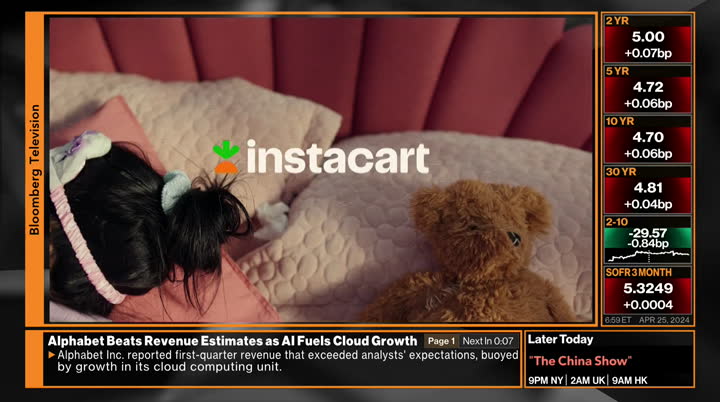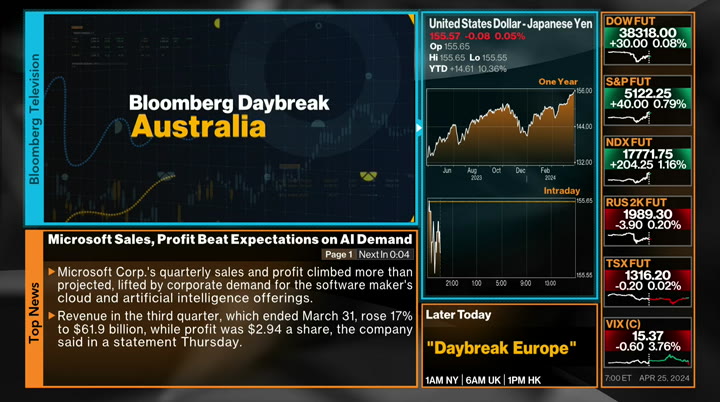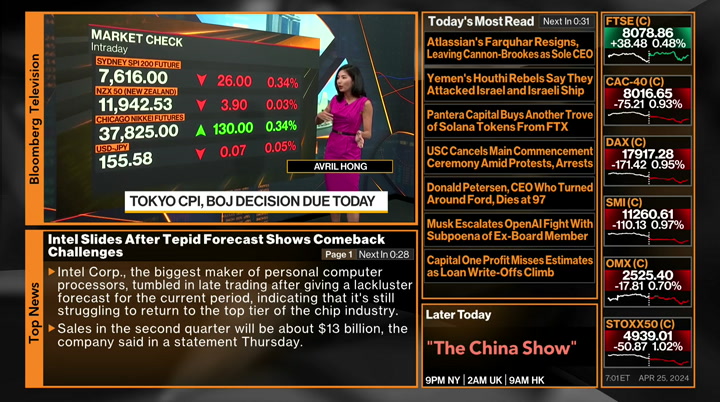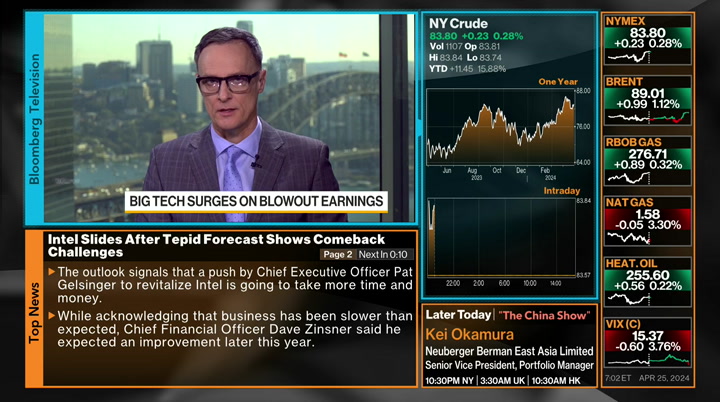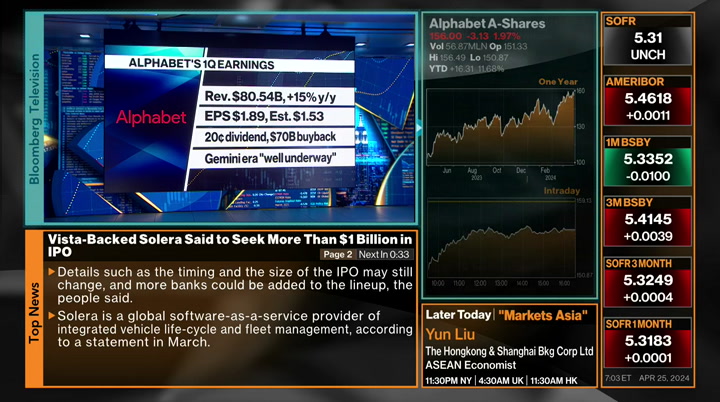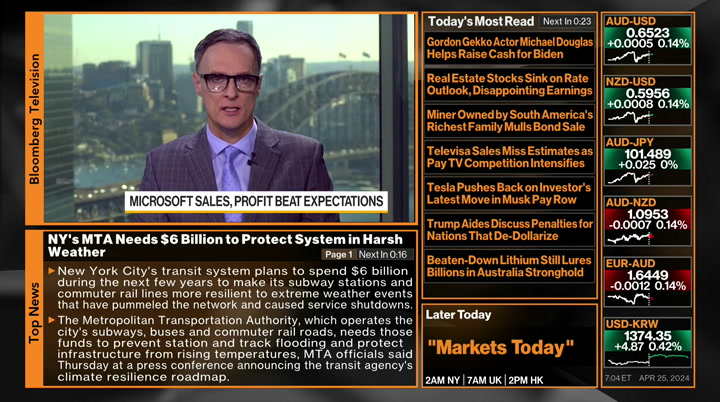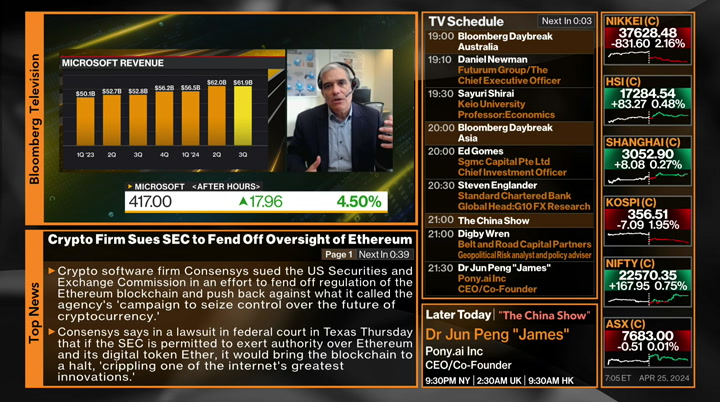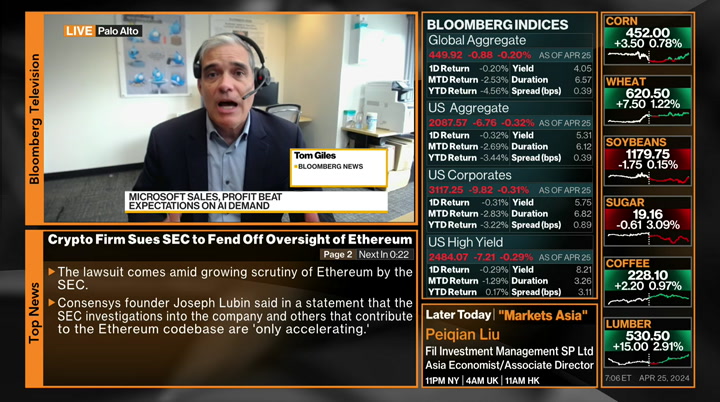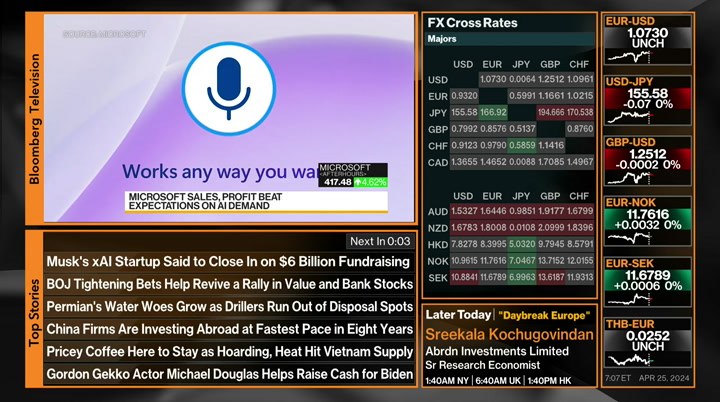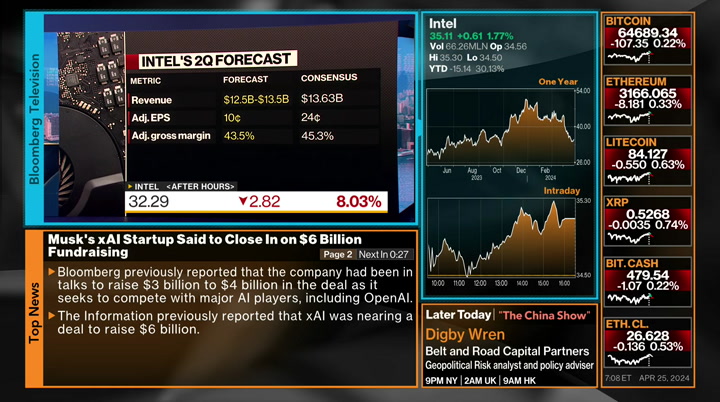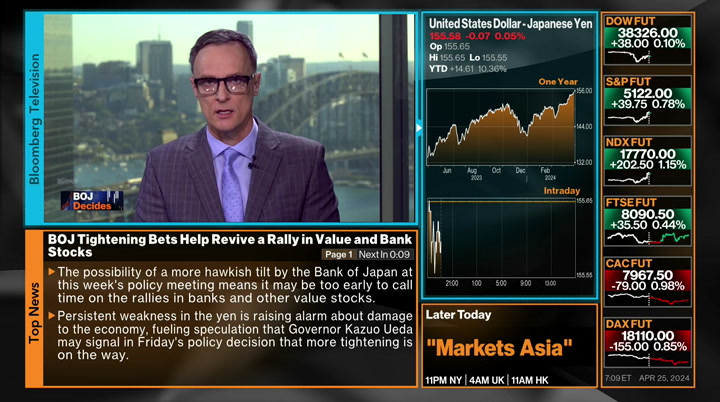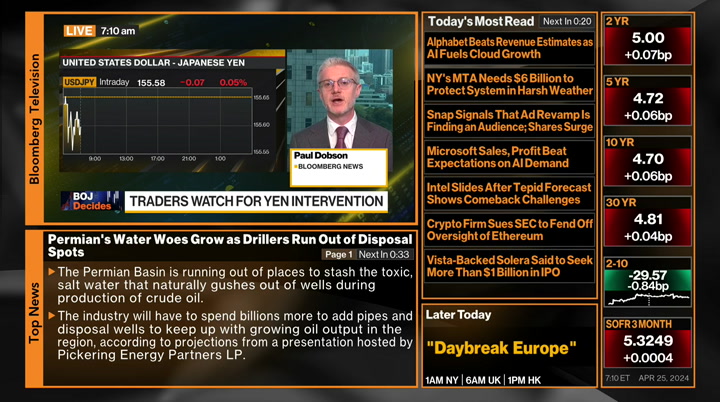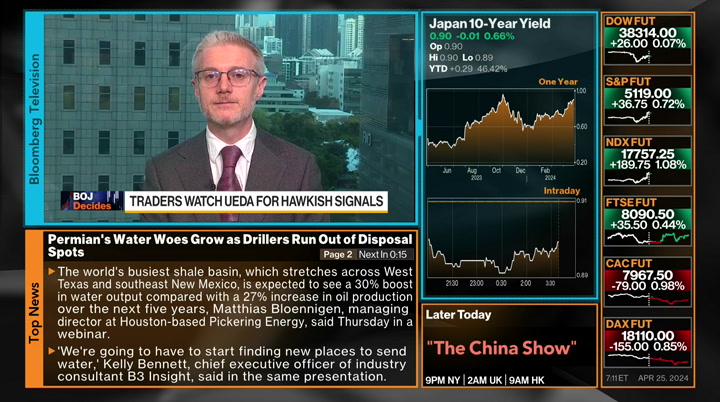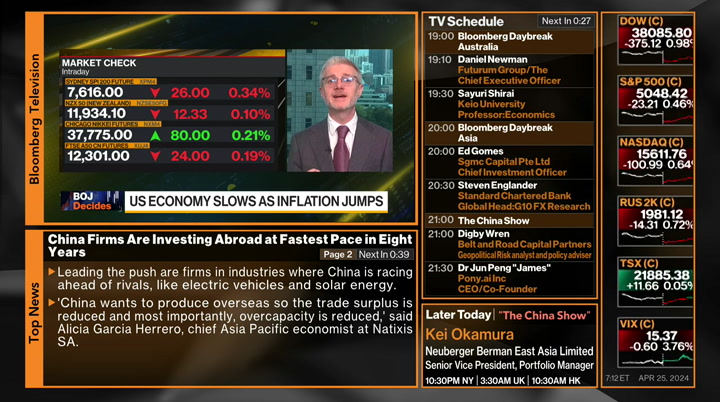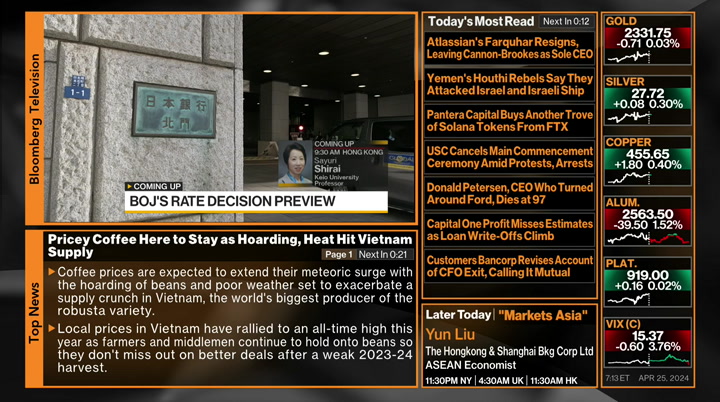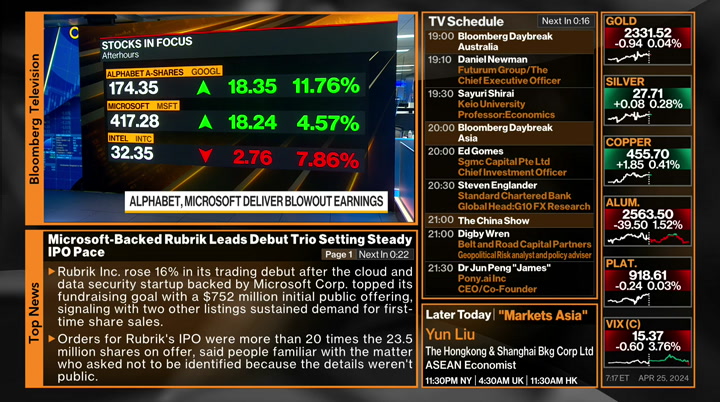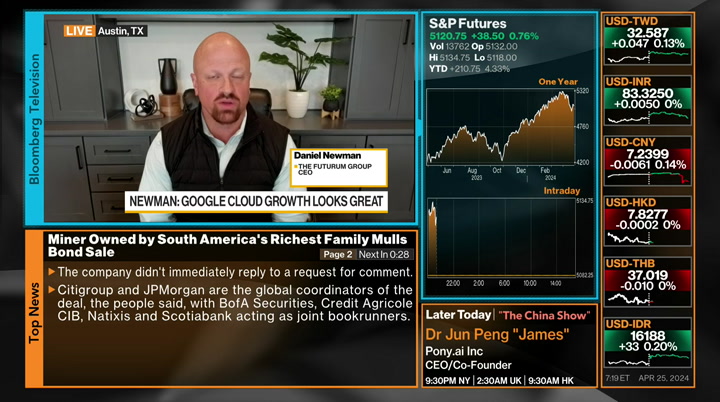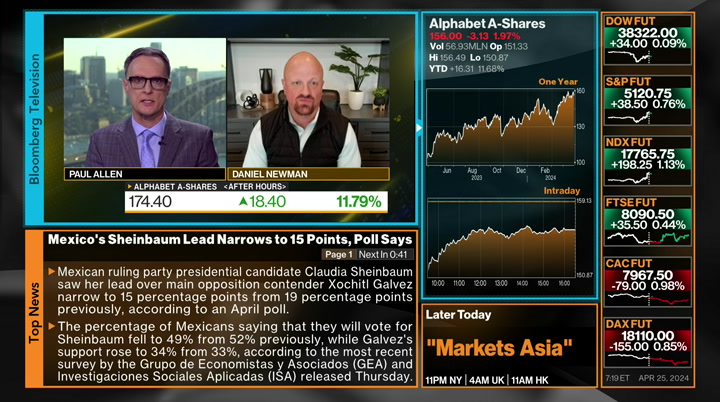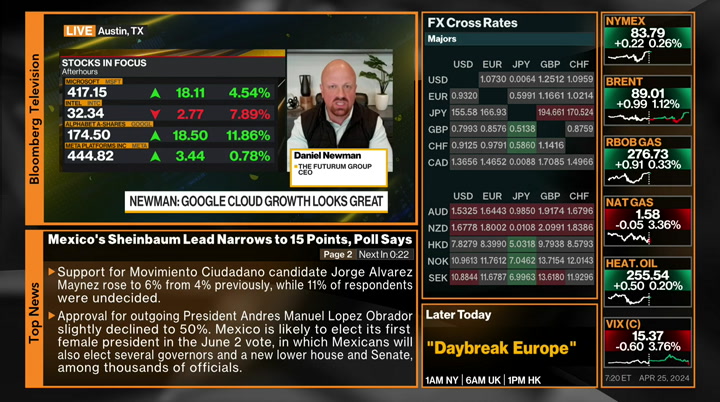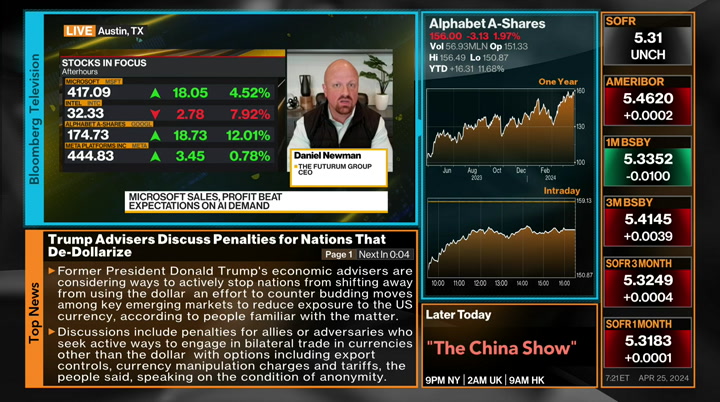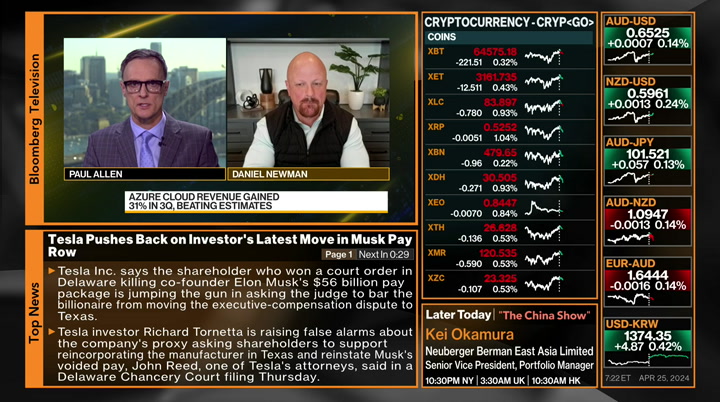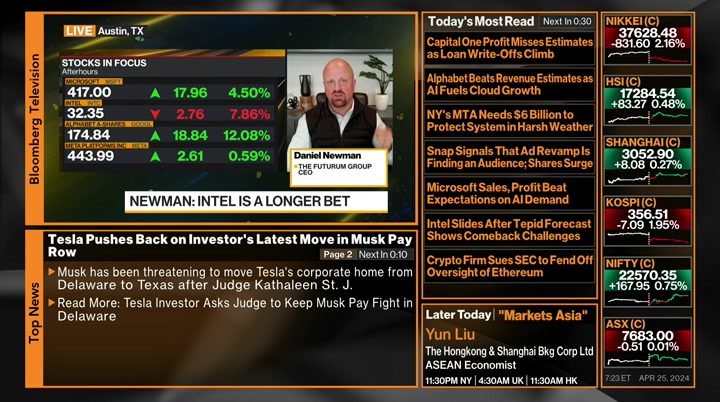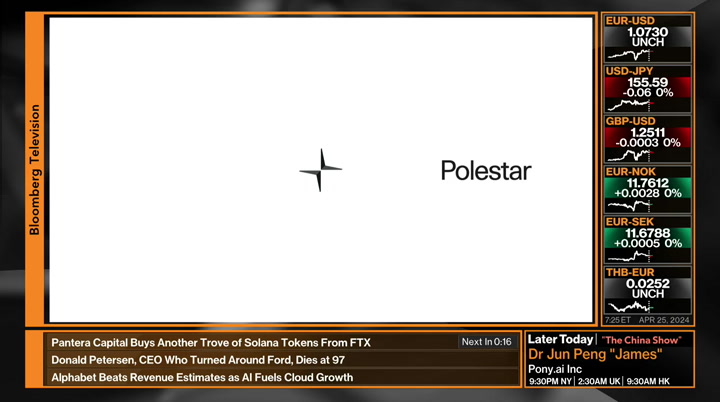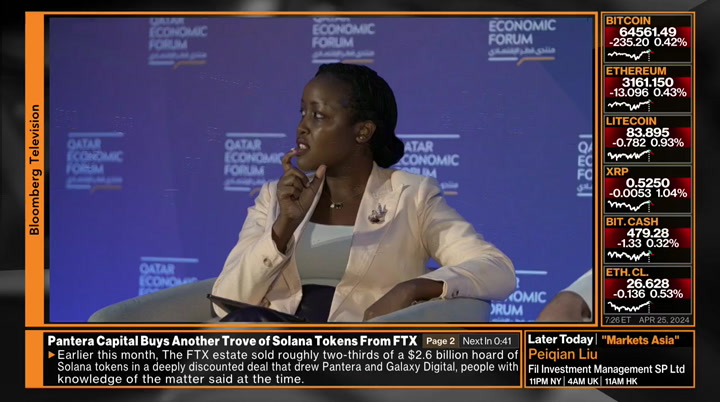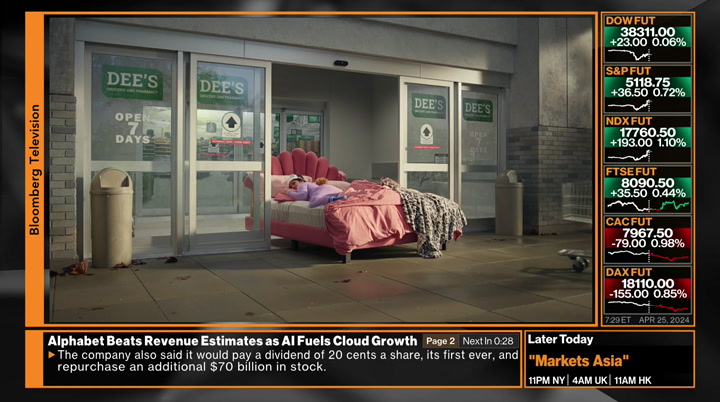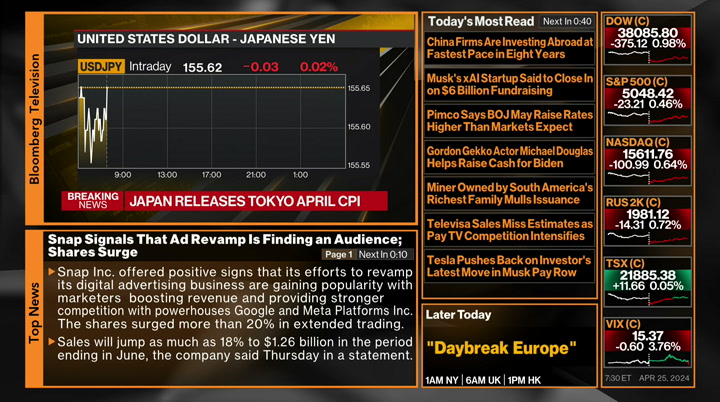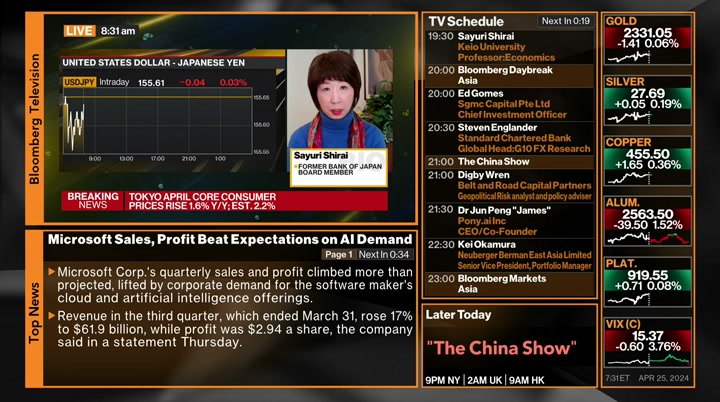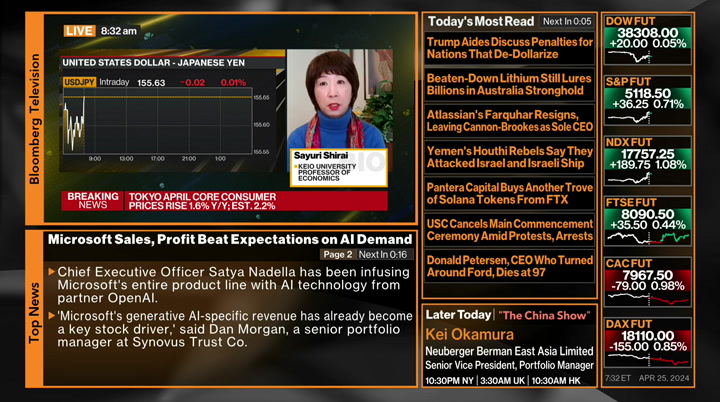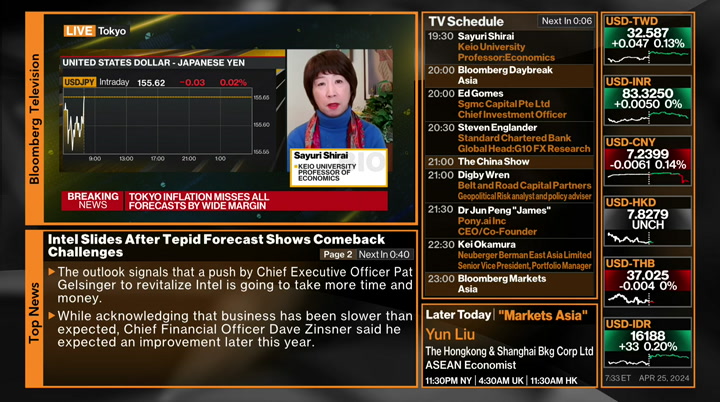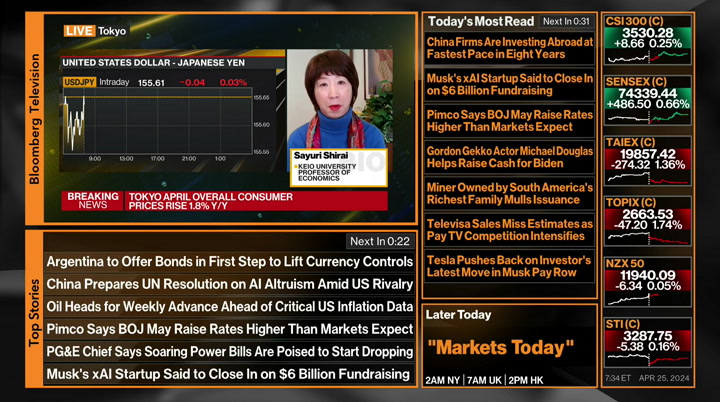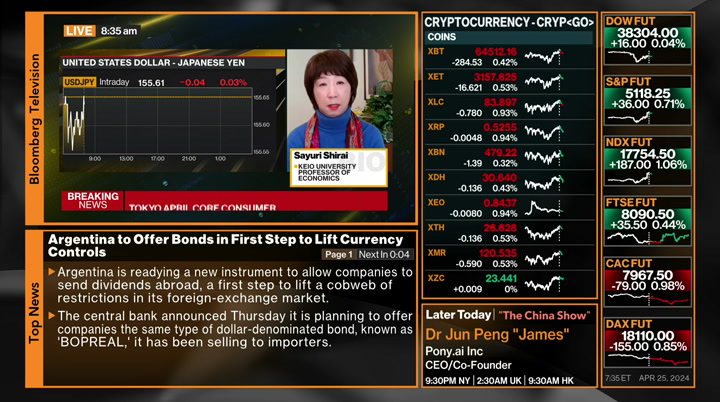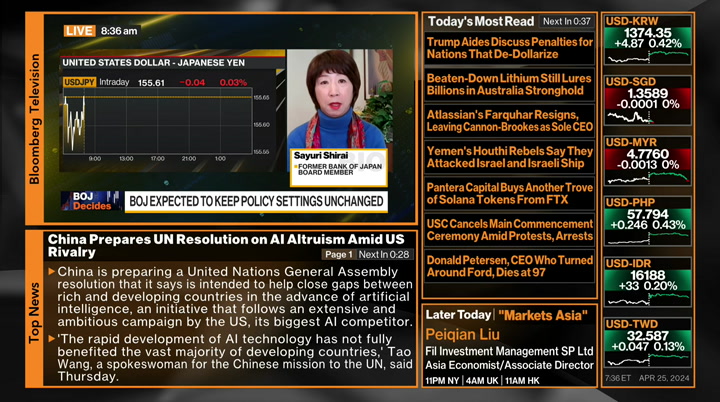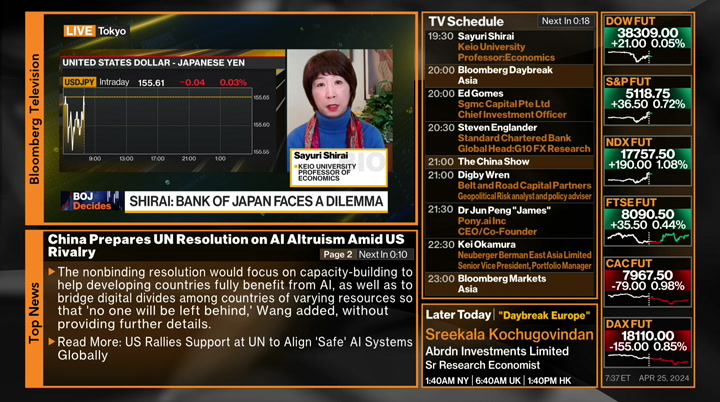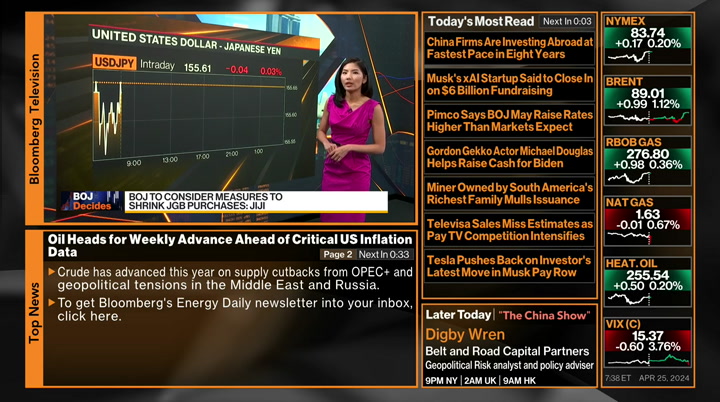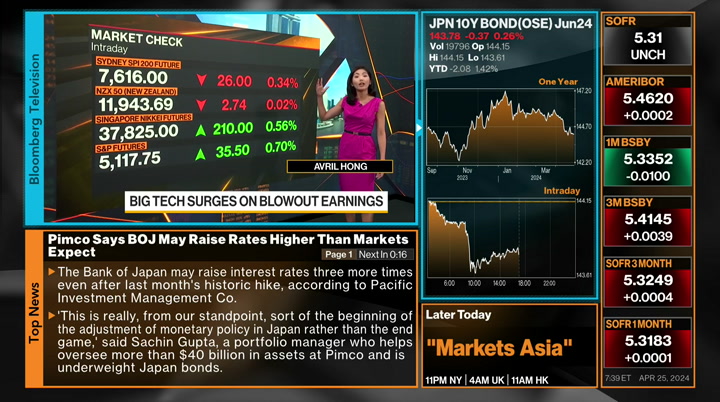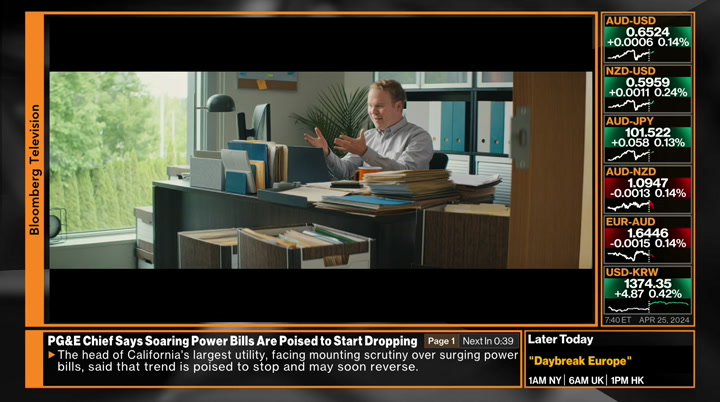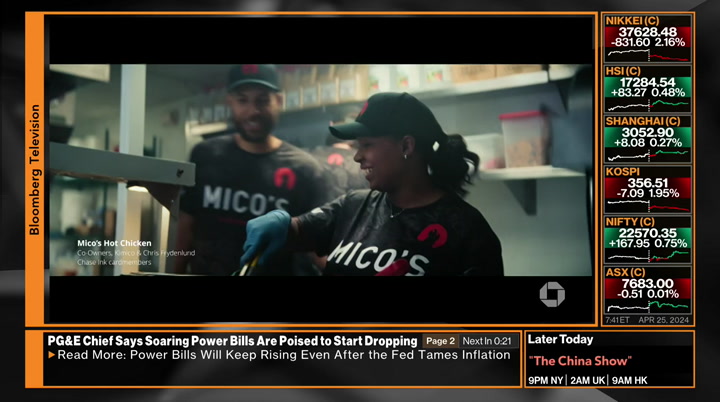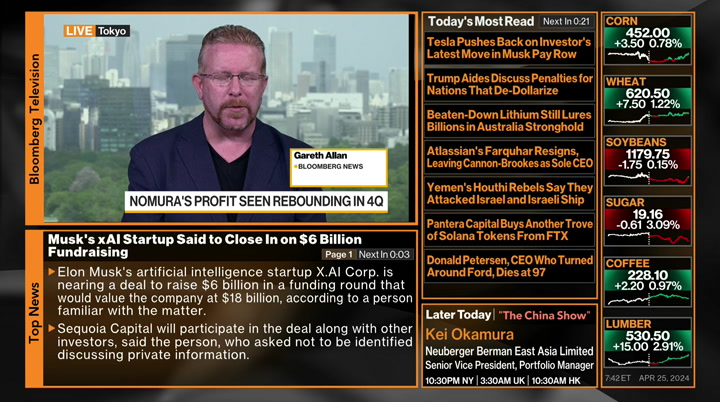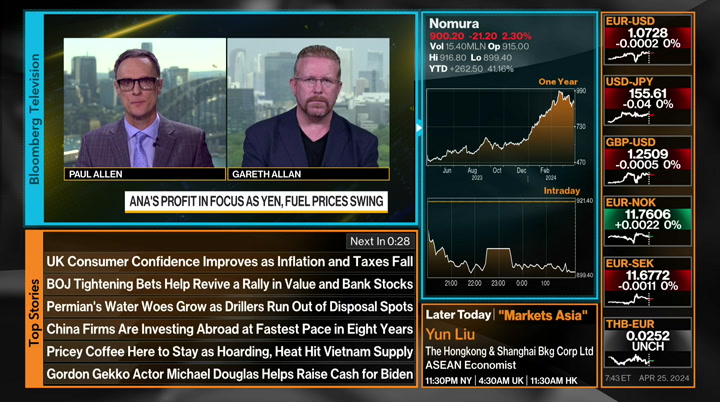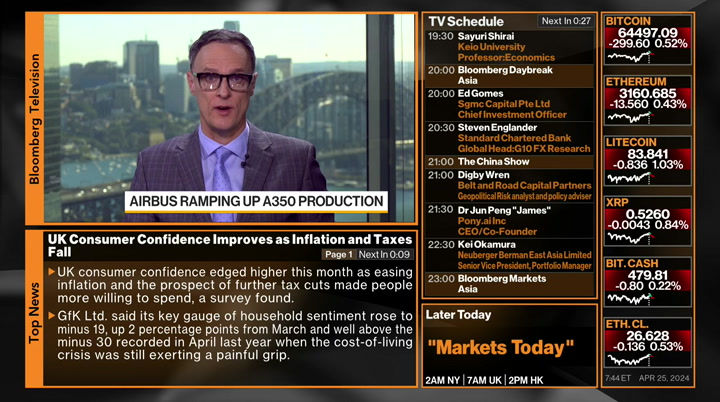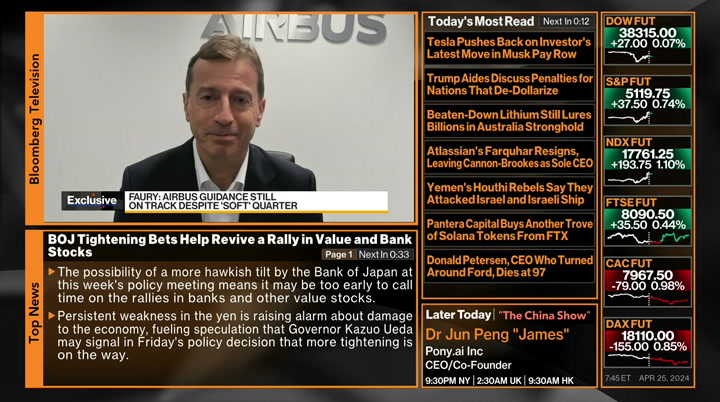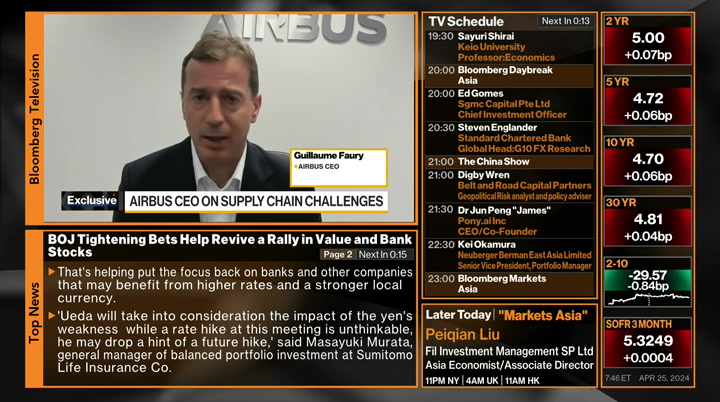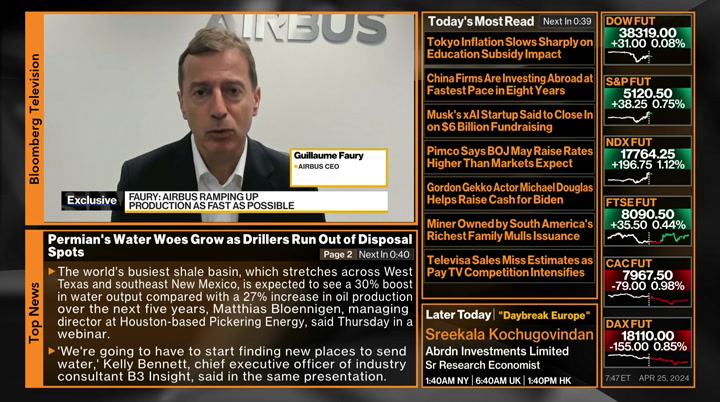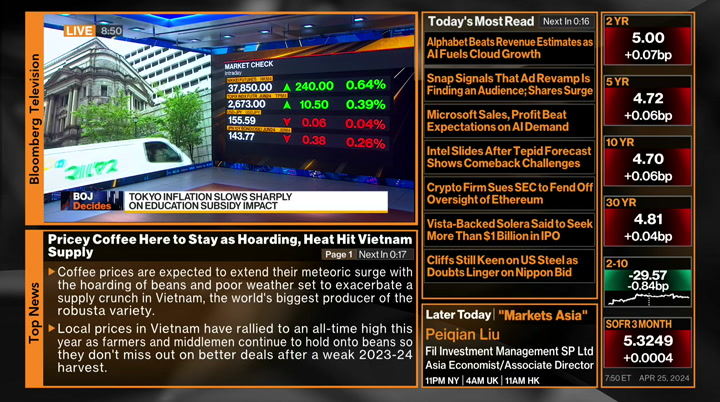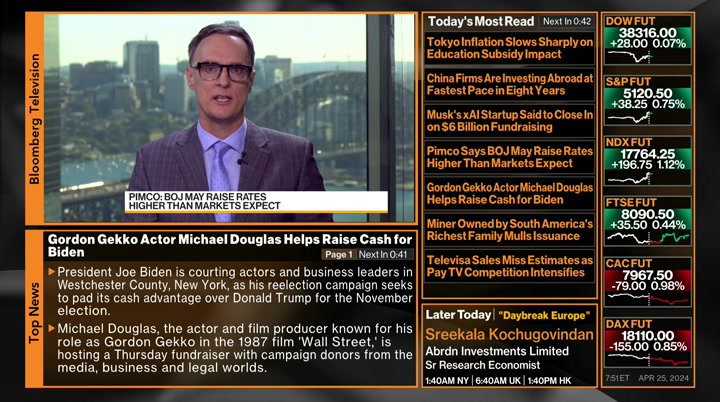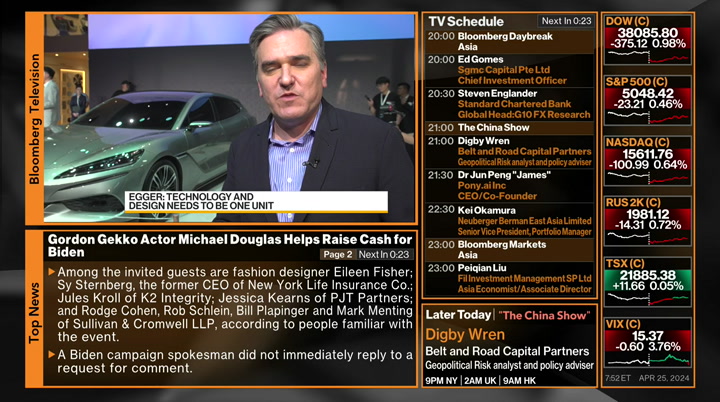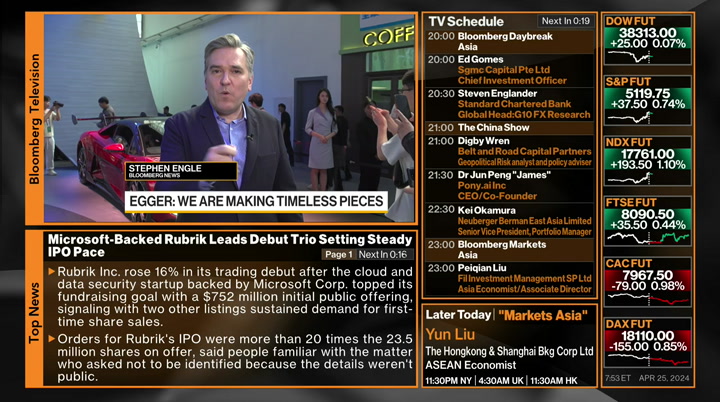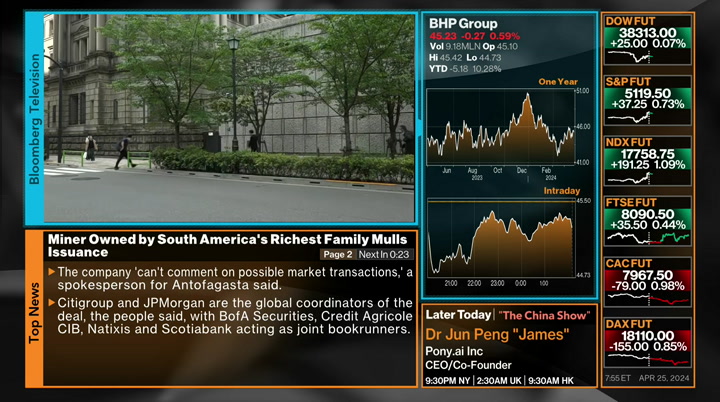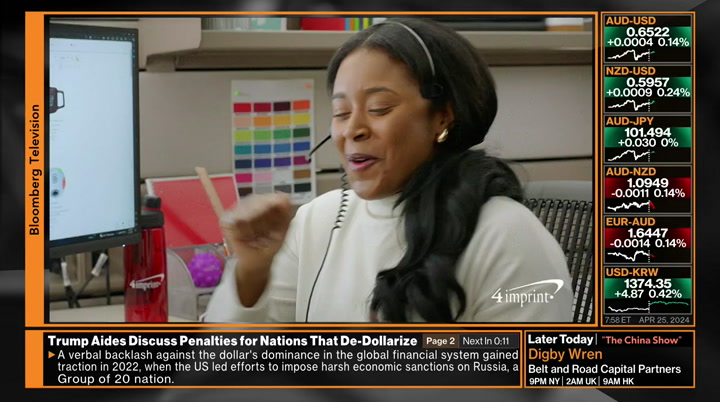tv Bloomberg Daybreak Australia Bloomberg April 25, 2024 7:00pm-8:00pm EDT
7:01 pm
australia. i'm paul allen in sydney. counting down to asia's major market opens. big u.s. tech jumping after the bell as earnings mostly beat expectations. a sigh of relief from investors worried about lofty valuations. elite rebound coming after markets were rattled by data showing starved inflation and slowing growth in the u.s. economy. it is decision day for the bank of japan. market players scrutinized for hawkish signals. plenty on the docket today. let's look at how markets are setting up for this friday in the asia-pacific. april hong is in singapore. >> it's a big day watching out for tokyo cpi numbers for the month of april do this hour. of course it's about the boj decision and more importantly whether we get hawkish signals. signals of quantitative tightening.
7:02 pm
the central bank is considering measures to reduce the levels of bond purchases, and in the meantime the likes of morgan stanley and mufg economists flagging a potential young shot from the tokyo cpi numbers because of a lack of clarity from the statistics bureau about how a component, the elimination of high school tuition fees, will be reflected in the index. that makes it a bit difficult for economists to meet forecasts. we are looking at nikkei futures pointing to a higher open and the yen about 155 .6. sydney and new zealand on break yesterday, futures pointing to declines. let's look at where u.s. assets are as we have numbers out of the data overnight that show on the quarterly front, came in hotter than expected but growth numbers were weaker. this complicates things for the
7:03 pm
federal reserve. we saw a selloff in treasuries and stocks, quite flat on the treasury futures but there could be a rise as we got big tech earnings. let's flip the board and take a look from the likes of alphabet and microsoft. really proving their bets on ai are starting to pay off. cannot say the same for intel as it really disappointed with a tepid forecast. paul: thank you. on the subject of alphabet, let's look at what the cfo had to say. >> we are very pleased with our financial reports for the first quarter driven in particular by strength in search and cloud as well as the ongoing efforts to durably reengineer our cost base. paul: beat organ sales and net income and a dividend as well. let's take a closer look at
7:04 pm
these earnings. julia love joining us from san francisco. a lot for alphabet to be happy about here. tell us about this quarters growth drivers. >> there was a lot of reassuring news this quarter for alphabet. they have been fighting for years to build a viable cloud business and over the past year they finally got in there. they reported a profit for the first time last year and this quarter, artificial intelligence drove gains for them and they are saying it gives them a competitive edge in the fight with microsoft and amazon. they also saw healthy growth in their core search advertising business which is reassuring because the business has been coming under threat from microsoft and openai with chatgpt. paul: going forwards, our investors reassured alphabet can maintain margins as it keeps investing more in ai.
7:05 pm
>> i think they are. they spent $12 billion on capex this quarter and the cfo says investors can expect to see the same level of funding for the rest of the year. at least this quarter they showed they can continue to deliver good results with that level of spending. paul: bloomberg technology reporter julia love. microsoft with quarterly sales and profit gaining more than expected lifted by corporate demand for the cloud and ai offerings. for more, let's bring in our senior tech executive editor tom giles. the numbers here for microsoft as well but assume -- similar question to alphabet. can it keep control on the margins as it invests more in the cloud and ai businesses? >> people really like the microsoft story even if it means investment spending, unlike what
7:06 pm
you saw with meta yesterday. the concern with meta-is that it will take a long time or a while for that spending to pay off. with microsoft, you are seeing a company weaving ai into its core products, whether that's azure or cloud computing, or if you're talking about for example, get hub, this company it acquired that uses generative ai to help programmers code more efficiently. whether it's using it for search, cybersecurity. microsoft is slowly but surely, and sometimes not so slowly weaving artificial intelligence into its core products and people are noticing it and buying into that story. plus similar to what julia was talking about with google, you have the cloud offering. azure is a big cloud services provider. as the ai boon gains attraction,
7:07 pm
people need more cloud computing power. if you make your cloud computing more smart using artificial intelligence, it is a virtuous cycle which will fuel greater demand for the product as well. paul: in terms of that virtuous cycle, there is a consensus microsoft has an early lead in terms of ai. is it doing enough to maintain that lead? what are competitors doing? >> they made this big early investment in openai and that has proven to be a magnificent decision in the eyes of investors. satya nadella saw the potential in sam altman in the business he was doing. he started investments early and has continued to invest in that. microsoft has the capital to fuel a business like openai and chatgpt which of course has been a major catalyst for a boom in funding and investing in artificial intelligence.
7:08 pm
can microsoft stay ahead of the competition? microsoft needs to continue to capitalize on the openai relationship. at the same time, it's all about making sure that investors and your customers believe in your ai story. do they believe you are weaving ai into core products including search? microsoft has been a huge laggard behind google in search. if microsoft can start to steal some of the march on google when it comes to search in terms of being search engine for example, it would be a huge advantage for microsoft. paul: it's not been all champagne corks for the tech earnings. let's talk about intel. this company used to be the world's dominant chipmaker and has had a tough couple of quarters. what are they doing to turn things around? >> intel is a company that as
7:09 pm
you said used to the dominate global chip manufacturing and could always be counted on to have the most cutting edge chips when it comes to servers and laptops and other devices. over the years, they have fallen away from being the leader. their technology has not advanced. their capacity for building the worst -- world's best, they ceded that leadership to the likes of tsmc in taiwan. in the area of ai chips, the 800 pound gorilla is nvidia. you have seen nvidia just run circles around intel. in terms of being thought of as a leader in the chipmaking space , because of its ability to make accelerators that are used to power the ai revolution.
7:10 pm
paul: senior tech editor tom giles. we will dig a little deeper into the u.s. tech earnings shortly but we want to get to one of the big other macro events in the asia-pacific, the bank of japan. they are expected to keep interest settings unchanged friday or the spotlight will be on governor ueda more intensely than usual because we have currency officials ramping up warnings about the yen which is right now trading around 155.58. gigi is reporting that the central bank will consider measures to shrink government bond purchases. let's get to our executive editor for asian markets, paul dobson. let's start with the boj, anticipating what could be rather interesting inflation data and the backdrop of a week yen. we are expecting perhaps not policy change but may be rhetoric change today. >> i think that is what investors are looking out for because of the currency
7:11 pm
weakness, there's a sense the boj needs to do something to give an idea that more rate hikes will be coming later in the year or mindful of what's going on with the currency. things to work out for -- look out for is referencing more aggressively the impact of the currency on the inflation outlook. investors may consider it would bring forward rate hikes if the yen continues to weaken. another option is to at least downplay the references to the pace of bond purchases that the boj is doing to allow yields to continue to increase at the back end of the curve. we are around 0.9% on the tenure -- 10 year rate. earlier on, maybe we can head toward 1% and higher. if it were to loosen, that would give more support to the currency. nevertheless, the market is
7:12 pm
still on tenterhooks for the idea that the ministry of finance might decide if the market reaction is not favorable in terms of the yen. then later in the day, it might need to do something to provide more oomph. we are talking about ramped up rhetoric in terms of intervention in the currency market or affirmative action. but that might be something we need to weigh as we get past the u.s. inflation data later in the day before the ground is clear for them to come in. paul: that's an interesting point you make. to what degree has the picture been complicated i what we saw in the u.s.? gdp slowing redder -- rather abruptly. what is the story? >> for hs markets, it is the worst of all worlds. slowing u.s. economy and
7:13 pm
quickening u.s. inflation that will only push up u.s. bond yields and ratchet up the support for the dollar and that will boomerang back to our markets and put asia fx under pressure again. not just the yen, but we may see more extreme reactions in other asian currencies. watch out for the korean won for example. we know we are up against pretty extreme levels and multiyear lows for currencies across the region. we know central banks are having to take action for support for their currencies. there may be more volatility as we look at them today. this evening we will get monthly pce data. investors will be watching that. so again it could mean higher treasury yields. the rate expectations for the
7:14 pm
fed get pushed out. we are looking for the one cup priced into the market but not until december. that could cause more dollar volatility particularly to the end of what has been a hectic and pretty busy week already for everybody. paul: yes indeed. it will be interesting from the boj on the back of all of that. still to come, counting down to the bank of japan rate decision and former boj board member sayuri shirai will talk about many things including whether the young's weakening streak will force the central bank to send hawkish signals. first we will talk to futurum group about whether the tech rally has led to alphabet and microsoft sales to skyrocket this is bloomberg. ♪
7:15 pm
7:16 pm
so i started my own studio. getting a brick and mortar in new york is not easy. chase ink has supported us from studio one to studio three. when you start small, you need some big help. and chase ink was that for me. earn up to 5% cash back on business essentials with the chase ink business cash card from chase for business. make more of what's yours.
7:17 pm
7:18 pm
11.7%. beats on revenue, earnings-per-share, buyback of first ever dividends. investors pretty happy about that. microsoft selling some impressive gains. ai and cloud again, standout performers. intel having a trickier time. what was the world's biggest ever pc processor provider having a pretty rough couple of quarters. we will talk about that with our next guest, daniel newman is the ceo of the futurum group. we want to start off with the goods in that story, strong results from microsoft and google. the triple q etf that tracks the nasdaq is up at on the flipside of that, we had rather troubling u.s. data, inflation proving stickier unusual and an abrupt slowdown in growth.
7:19 pm
when you look at those names, do you have a temptation to take some profit? >> first of all, the set up for today was interesting with the gdp number. we saw meda came out with good numbers after yesterday but a guy that worried service now had a particular result. we needed a strong google and strong microsoft to come through and show that this ai exuberance is also built on real data and real numbers. right now there are a lot of macro factors that might make an investor say it's time to take risk off the table. you look at the growth of azure and google cloud, eye watering numbers. you listen to ruth at google talking about expanding the company's margin and driving deflationary growth, meaning more profitability in margin. it sets up that these big tech companies leaning into ai have a
7:20 pm
really exciting story. my concern is this also shows some concentration that may be only a few companies will be benefiting from this ai wave in the near-term and for an investor, that should bring some concern. paul: let's start breaking down some of these companies here. alphabet for example, a beat across the board and first ever dividend. can you see some potential risks to the outlook coming? antitrust lawsuits and still a lot of spending needed to stay in the ai race. what to the next quarters look like? >> i like google a lot here despite the fact that there are concerns. there is going to need to be substantial investment. compared to mental, more investment has been made. for google, it's been a multi-decade investment in the company has just started to hit that perfect inflection. google was a little behind the curve in the first wave of
7:21 pm
cloud. microsoft and a ws got off to a faster start. now you are seeing that pedigree google had in ai starting to play to its advantage. the search is what i'm most worried about. i'm concerned about how generative ai capabilities, whether that is a meta-ai tool or the way summaries and generative apps are able to do search in a way that drives revenue away from search. that's a little concerning to me. having said that, i thought when microsoft had being with chet dbt that it -- chatgpt, that it would make a dent in google, but it seems like it's really sturdy. paul: can you potentially see that changing though? microsoft is often credited with having an early lead in terms of ai and investments in openai seem to be paying off. could that change? google did not become the
7:22 pm
primary search engine overnight. are we perhaps going to see something similar with chatgpt and openai? >> i think microsoft made a really good bet with openai. you could argue building it in-house was the approach google took and all of them are doing this democratizing activity whether it's anthropic or o'hare. they are all tied to many different bets like chipmakers. microsoft has a really sturdy ai practice as well. we saw great growths in their workplace business. i think where they have the advantage is that they were first out of the gate and created that strong inertia to the company. i think what we are looking at his overall expansion. i think companies will be hedging in terms of edger --
7:23 pm
uses of the cloud. microsoft is around 30% cloud growth. i'm looking for google and aws to start to share a little more data and give us more visibility . but i love that microsoft came out and said this is how much of our azure growth is tied to ai. that says the company is comfortable, the deals are growing, enterprises are spending more with them and it is ai specific. paul: let's look at intel, some disappointing sales and profit numbers, but i understand you have in speaking with the ceo. did you hear anything that reassured you? >> intel is a multi-year investment play for a lot of investors looking for that short-term win. they have to understand the new segmentation, the products and foundry is all about becoming a critical infrastructure partner to the u.s. and the west for a
7:24 pm
supply chain resiliency, national defense, global technology and economic readership. i think intel has made the commitment. in the conversations we've had and he has shared publicly is that the company -- company has hit targets. it was a problem for a long time in terms of getting the newest process and products to market. we heard that ai pcs will ship in volume ahead of the holiday season. this is a better turn of events for the company. he reiterated that we are a second-half company, so it gave me some reason to believe may be the softer second-quarter guide is a bit of a goalie before a better back half. having said that, of course the competition with nvidia and amd for ai chips, the company needs to land intel, gaudi, and moreover it is gaudi plus and data center chips as of viable
7:25 pm
product. it has not settled in the market yet but i do believe technologically speaking, it is there, but they need that to land. paul: daniel newman, ceo at the futurum group. unfortunately we are out of time but thank you as always for your insights. get a roundup of the stories you need to know to get the day going in today's edition of daybreak. terminal subscribers go to dayb . it's also available on mobile and the bloomberg anywhere app. when you're there, you can customize settings so you're only getting news on industries and assets you are interested in. this is bloomberg. ♪
7:27 pm
7:28 pm
japan decision day. let's take a look at how assets are tracking ahead of that. the yen still very very weak and we've heard as expected, plenty of signaling on potential intervention. that would come from the ministry of finance, but the bank of japan might have something to say in terms of rhetoric to put a floor under the yen. equity futures are in positive territory. of course we might see tech stocks get a bit of a bump after really good numbers out of alphabet and google. we might hear words from the we might hear words from the future of bond people couldn't see my potential. so i had to show them. i've run this place for 20 years, but i still need to prove that i'm more than what you see on paper.
7:29 pm
7:30 pm
7:31 pm
one .8%. the expectation was for 2.5%. before we get too excited about this, there was some news that helps explain this. in tokyo, there was the elimination of high school tuition fees which took effect in april. there was not a great deal of clarity on how the statistics department might deal with that adjustment. it's possible this undershooting on the tokyo cpi numbers is a reflection of that and may not impact national cpi numbers. maybe with a little context here to explain why the number was such a miss. but a miss it was, 1.8% in april. our next guest might have a bit of insight. sayuri shirai joins us, professor of economics at keio university and served as a board
7:32 pm
member at the bank of japan. thank you for joining us. i want to pick up on the point i was making about tokyo cpi. it was a miss but how much of this could we explain away in terms of tokyo unique story? >> japan's inflation is actually a declining trend so i don't really have surprise. further inflation is coming down gradually but in the meanwhile, inflation starts to pick up in may because the government will stop subsidy to provide to the utility deal. there will be some jump in energy prices in may. there are a lot of ups and downs, but underlining inflation is quite weak and i think coming down. paul: as i mentioned, high school tuition fees were eliminated in tokyo and that decision took effect in april. with that explain such an outsized miss in tokyo cpi? >> at this moment, japan's
7:33 pm
inflation is affected by only five items. food is the main. energy is also affected by rising gasoline prices. subsidies are affecting down pressure. there's also hotels and foreign tourists, overseas tours, and mobile communication. so if there was no changes in terms of prices of the five items, immigration would be below 1%. inflation is very weak because the demand is weak. i don't really think current inflation at 1.8% is set. may be captured by the tuition free -- flee but the underlining inflation is not really. paul: we are not anticipating
7:34 pm
change in rates but do you think we see a change in rhetoric in terms of trying to support the yen? >> i think the governor may have to have the more hawkish stance this time. the japanese economy is really stagnant to be honest. wages are dropping. construction is dropping. in that sense, maintaining interest rates unchanged is reasonable. at the same time if the boj emphasized too much maintaining currency policy is good for the japanese economy, that might induce more deflation. i think the governor will give a hawkish tone. he may hint the possible reduction of japanese bond purchases from ¥6 trillion and some hinting about future short-term interest hikes.
7:35 pm
paul: perhaps hinting around changing bond purchases but do you expect any actual changes to bond purchases by this afternoon? >> there might be a slight possibility because of the current situation. they have been saying they are ready to intervene in the foreign exchange market. they've tried to use every communication tool. for example, communication with janet yellen and the korean minister of filing -- finance. but i think a market test is what they need to do. i think this would lead to some intervention quite soon. paul: how is yen weakness and inflation impacting households in the broader economy in japan? out urgent is this a problem that needs to be addressed? >> so if we think about the
7:36 pm
appropriate exchange rate, it should be 110 and at most 120. the current level of the japanese yen is too cheap. there is no other currency that moved this drastically. it's hurting the economy because we are importing almost everything. we have to buy a lot of imported products at very high prices and it's only hurting the japanese consumer. a lot of people are unhappy about this situation. in that sense, i think the government and bank of japan worry about this consistent movement of the japanese yen. paul: currency instability though is not really part of the bank of japan's mandate, but there is an opportunity to send a clear signal. what sort of statement do you expect from governor you eta about the yen?
7:37 pm
>> i think the bank of japan is facing a serious dilemma. if we are looking at the japanese economy, it is really stagnant and there's no strong momentum. completely different from the u.s., whereas the u.s. economy is too strong. services are booming. japan is the opposite. there's is no demand driven inflation so the complete opposite. theoretically the bank of japan should maintain current interest rates but they only invite stagnation. but i think today the governor and a press conference may suggest more hawkish tones and possible action. otherwise i think there's danger the yen may depreciate even more.
7:38 pm
paul: we did get a complication out of the u.s. earlier today as well, quarterly gdp showing a pretty abrupt slowdown and pce inflation showed inflation in the u.s. is pretty sticky as well. how does this complicate the picture for the boj and does it give a few more options in terms of the timeline when it comes to rate increases? >> u.s. gdp growth was as low as expected but u.s. services actually grew a lot. the u.s. economy has remained very strong. services and u.s. activities are growing and prices in the u.s. are rising. this is a quite serious concern. it's difficult for japan because of the persistent interest so probably japan would face constant pressure on the yen depreciation, so it is
7:39 pm
difficult. in the sense that the boj, whether they take action is not clear but i think they have to have some hawkish tones. paul: sayuri shirai, professor of economics at keio university, thank you for your analysis. 1.8% in the month of april for tokyo cpi which will have implications for currency. let's get over to avril hong in singapore. avril: we are seeing the yen versus the dollar not really budging that much on the back of the big miss on tokyo cpi. professor she ride was outlining that there's little surprise given how underlying inflation has been week. this continues on a trend. but the boj complication is how the yen depreciation is going to perhaps force it to come through
7:40 pm
with more hawkish signals. indeed that's what the markets are betting on. we are seeing bond futures pointing to drop in cash bonds. let's take a look at what we are seeing in the stock markets because futures are pointing to a bit of a climate the open. this is thanks in large part to what we got out of big tech earnings in the u.s. with alphabet and microsoft coming through with how ai bets are paying off. futures in the u.s. pointing to a positive start. we are washing for the open in new zealand and australia. australia watching iron or producers in the next hour. let's take a look at the commodity. the singapore contract has been hovering at a seven week high and this is largely to do with the improvement and sentiment on the chinese economy especially on the gdp. despite the recovery in the month of april, it is still about 13% down from the start of
7:41 pm
7:42 pm
starting a business is never easy, but starting it eight months pregnant.. that's a different story. i couldn't slow down. we were starting a business from the ground up. people were showing up left and right. and so did our business needs. the chase ink card made it easy. when you go for something big like this, your kids see that. and they believe they can do the same. earn unlimited 1.5% cash back on every purchase with the chase ink business unlimited card from chase for business. make more of what's yours.
7:43 pm
paul: analysts are expecting japan's biggest brokerage to report a strong profit rebound. let's bring in our breaking news editor in tokyo. what could be the reason for its recovery? >> good morning paul. after the bell today reporting, the year end yen numbers are going to look good inevitably because they had a dismal fourth quarter last year. don't look at the percentage, look at the reasons behind it. japan's stock market in the quarter to march had a massive rally reaching record levels. it would be interesting to see how well no more rows retail business has been able to take advantage and the level of profits they've been able to get out of the trading business in
7:44 pm
japan. a couple analysts have said this quarter, they are not expecting a buyback at this point, a buyback would be a surprise. the stock price has done pretty well, they are up 4% already on the back of the strong japanese stock market. definitely one to watch this afternoon. paul: we will hear from a and this afternoon. will it be the inbound tourism boom or the week -- weak yen to drive performance? >> that's right. the yen is a double-edged sword for companies like ana. they have rising fuel costs. they have to pay for it in yen which is less than it would be otherwise. analysts say they are expecting a profit contraction.
7:45 pm
the flipside is japan at the moment is experiencing an inbound tourism boom because of the weak yen and it is so cheap to come here. so how much they will take advantage of the boom rules will be something to keep watch over when they report this afternoon. paul: our breaking news editor gareth allen in tokyo. the airbus ceo says the plane maker is ramping up production of the a350 wide-body jet to meet surging demand and looking past weakness. in an exclusive interview, they already -- also discussed how the company is managing ongoing supply chain issues. >> we have delivered 140 two commercial airplanes in the quarter which is 12% higher than last year. in terms of production deliveries, we feel we are on track and that is very important. the quarter is indeed a bit soft
7:46 pm
but it is on track with expectations to keep guidance and change for the year. and we are building a lot of inventory we want to make sure we are their resources and have hardware and equipment and everything we need to have growth like last year. >> there's a line that pressed -- stands out from the press statement and i think it's worth repeating to the audience. we delivered first-quarter results against a backdrop of an operating environment that shows no signs of improvement. geopolitical and supply chain tensions continue. why are you still dealing with supply chain issues?
7:47 pm
many other industries faced these problems during the plandemic -- pandemic but they are in the rearview mirror. why are they so hard to fix? why is the supply chain not been sorted out quickly? >> very important question. we are in a long-term industry. we employ people which are highly skilled and qualified and a significant number of the workforce of the people who left companies in the supply chain with other companies during the pandemic, so we are rehiring people. but it takes a lot of time to onboard them, train them, give them qualifications at full speed. this is a bit across the supply chain. there is another reason why we are in this difficult environment and we remain in a child lynched supply and valor
7:48 pm
meant -- environment mud because we are going at full steam. this will continue until we reach the rate in 2026. we've decided to ramp up on the a 15 beyond what was already announced, up to rate 12 in 2028. we are victims sort of of our own success. we have a lot of demand higher than the supply and this will continue to stretch the supply chain for some years. paul: that is the airbus ceo speaking exclusively with our colleague guy johnson. watch us live and see our past interviews on our interactive tv function, tv . you can dive into any of the functions we talk about and become part of the conversation as well and send us instant
7:51 pm
lower than even the lowest estimates. 1.8% was the reading for april. the expectation was for 2.5%. 2.2% was the expectation. the yen has not moved a great deal, but right on cue we have heard from the finance massacre finance . he said they will take all possible moves for the yen. at the moment, the specifics seem to be doing talking about the currency, nothing has actually happened yet. of course the boj meeting today as well. we heard from pimco earlier also for the numbers came out. pimco says the bank of japan might raise interest rates three more times even after last month's historic high. but those remarks came out before cpi numbers.
7:52 pm
china's largest auto show is back in beijing after a five-year absence. some of the biggest names in the industry showcasing extravagant new models. stephen engle spoke with the head designer about the inspiration behind the cars. >> technology and design need to be one firm unit. for this, we are also as designers and byd in general, customers are very happy because the latest technology are thought from the very beginning to offer the opportunity to realize the proportions. sometimes you want to do it and you cannot because the pace is not adapted. but in our case, we are so lucky that we have wonderful platforms.
7:53 pm
>> this is wolf gained egger's latest offering from the joint venture byd has with mercedes. danza is the company and the car is the xina nine gt. you can see those european influences coming out in the lines of this car, kind of a shooting break style luxury ev emphasizing technology as well as speed. this call will go zero to 100 kilometers per hour in just two seconds and it could be quick to the european market perhaps as early as the fourth quarter of this year. >> the company chairman, my boss, they give complete free space for design because they know the importance of design. i never enjoyed so much freedom as i am doing here now. the thing is really to search again and bring back the emotion to these cars with the beauty.
7:54 pm
the line is very elegant. still not art, but we are looking to get close to this challenge to have timeless piece and a beautiful piece that people can love all over the world. >> you can see his lamborghini experience in this super sports car also from a byd affiliate. speed obviously is a big theme here including speed to market. one thing egger told us is unlike the legacy automakers in europe, byd and chinese automakers can take it from design phase to market pretty quick in as little as about two years. >> the speed is higher. we are running much more and working hard. the team is working day and night very hard. they are in competition,
7:55 pm
creative competition, but they are one team with a common heart. now we reached the 24 months target for developing the car, to the production. so yes, this is amazing for me. >> and what would a beijing auto show be without a concept car? this is the supercar, perhaps his vanity project. it is a concept but could come to market. it is the super nine. i can kind of see where the inspiration came from. if the batmobile or the mach 5 from speed racer were and ev, this would be it. limited windshields, no roof, fast as lightning. stephen engle, bloomberg news at the beijing auto show. paul: we are continuing to live coverage at the beijing auto
7:56 pm
show. the china show team speaks later to the pony aia ceo about his outlook for the ev sector. these are the stocks we will be watching when trade opens in korea, japan and australia shortly. asian techs in focus after microsoft and alphabet beat expectations on strong demand for artificial intelligence and australia markets reopening after yesterday's holiday. we will watch bhp following the move to purchase anglo american. market opens coming up in sydney, soul, and tokyo. this is bloomberg. ♪
7:57 pm
7:58 pm
8:00 pm
paul: this is daybreak asia. we are counting down to the major market opens. could be a pretty interesting session today as well, a lot of factors to consider here. we just had a big miss for tokyo cpi on the eve of the bank of japan meeting. we heard some more currency talk from the finance minister about supporting the yen. blowout results for some u.s. tech stocks. concerning data out of the u.s. as well. how is the market going to balance out of this? avril: there's a lot to digest. thinking about how the stagflation chatter is coming back to the four in the u.s. and how this yen depreciation will figure into the conversation for boj policymakers? we are waiting with bated breath whether this forces the japanese central bank to come through with hawkish signals. we do have the open in japan now and now the big tech tailwind
4 Views
IN COLLECTIONS
Bloomberg TV Television Archive
Television Archive  Television Archive News Search Service
Television Archive News Search Service 
Uploaded by TV Archive on

 Live Music Archive
Live Music Archive Librivox Free Audio
Librivox Free Audio Metropolitan Museum
Metropolitan Museum Cleveland Museum of Art
Cleveland Museum of Art Internet Arcade
Internet Arcade Console Living Room
Console Living Room Books to Borrow
Books to Borrow Open Library
Open Library TV News
TV News Understanding 9/11
Understanding 9/11